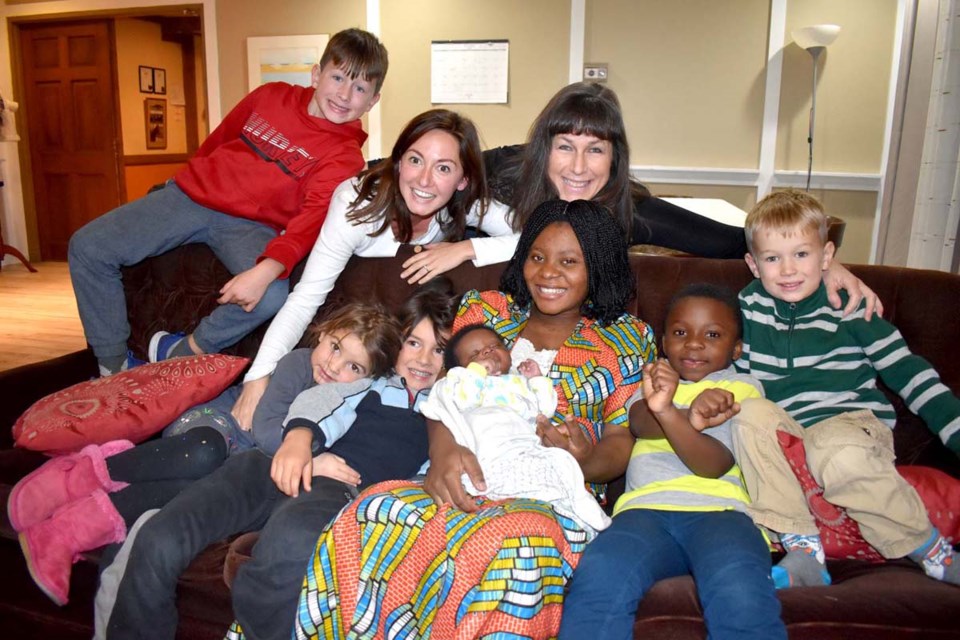From war-torn Congo to a refugee camp in Namibia to a safe home in Richmond.
For Atosha Ngage and her son Delphin, it was a five-year journey to arrive and settle in Canada, made possible through the sponsorship of five families, three of whom were from Richmond.
Their arrival has been life-changing for the single mom and her son — and for the baby Ngage was expecting when she arrived, born just a few weeks ago.
But the process of helping someone flee a war-torn country and start a new life has also had a profound impact on Karina Reid and Nicole Javadi, two of five sponsoring families who brought the Congolese refugees to Richmond through the Blended Visa Office Referred (BVOR) program.
“There are 68 million displaced people in the world right now, the largest displacement since the Second World War,” said Reid. “How do I just function and not care what’s happening to all these people in the world?”
Learning about the global refugee crisis and about stories like Ngage’s has made Reid question her values and understand how good her life is.
“The self-reflecting aspect has been really big for me — it’s changed the way I see the world and my own privilege,” Reid said.
Ngage escaped the Democratic Republic of Congo with her father, her brother and her young son and together they made their way by bus and boat to a U.N. refugee camp in Namibia. They lived there for five years until Ngage and her son found out they were being sponsored to come to Canada.
Since arriving, Ngage has found a home, started a new job, welcomed a baby — who is automatically a Canadian citizen — and is making plans to go to school to become an early-childhood educator.
This is the second family Javadi’s family has sponsored.
Javadi said she was shocked into action when she heard the story of the young Syrian refugee, Alan Kurdi, who drowned in 2015. He was the same age as her son, and she immediately googled “How do you help refugees?”
She discovered the Canadian-government sponsored program, BVOR, and became involved in bringing over a family of five from Syria.
Through the program, refugees are pre-approved to come to Canada and they are then chosen by those who wish to sponsor them. The government supports them for the first six months. The sponsors then each pay another $340 per month for six months.
“Sponsorship is a way of tangibly doing something about the refugee crisis,” Javadi said.
While sponsoring refugees is a big financial and emotional commitment — helping them find housing, connecting them with the school and health-care systems — Javadi said there is support from the government and agencies like Success and Mosaic.
Javadi said she knows many people who would be financially able to sponsor a family, but she still struggled to pull together a group of five families, acknowledging “it wasn’t an easy ask.”
But her and Reid’s message is that it’s possible to have a direct impact on families stuck in the refugee crisis through the sponsorship program.
Last year, Javadi once again felt the need to sponsor more refugees to come to Canada, and appealed through her network of friends to bring together five families. That’s when Reid responded.
When reading about the refugees who were pre-approved to come to Canada, Reid said she wanted to help everyone.
But Ngage’s story struck a chord with the group of five families because she was a single mother with a young son.
Through this process, Javadi said she’s learned how much the west benefits from the developing world through the exploitation of its resources, making everyone complicit in the refugee crisis.
“It’s our privilege to have cheap goods,” Javadi said. “In response to that, what we’re really causing is turmoil and war in other countries.”
Ngage’s family was from a small village in Congo, but because of the violence in the country, her family fled to the city where she grew up.
On one of their first days in Canada, Reid took the mother and son to Richmond Nature Park – they were shocked that anyone could walk safely in a forest. In the Congo, the forests are full of bandits, Ngage said.
No one ever just walks in the forest in Congo.
“We just went for fun to walk through a forest,” Reid said.



